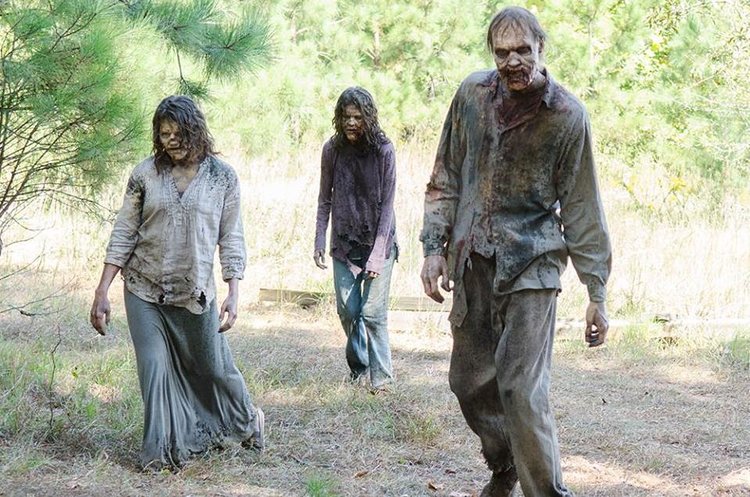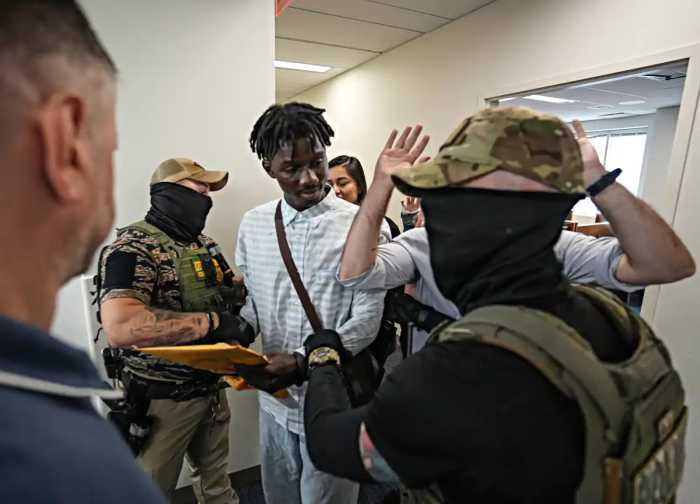By Lissa Harris
Talking with my friend and fellow The Walking Dead fanatic about the two most recent episodes, titled “Forget” and “Spend,” she mentioned that she’d just seen “American Sniper,” so the subject of Post Traumatic Stress Disorder came up because it seems to be affecting each character on the show.
For the moment, the group has found a seemingly safe haven in Alexandria so we get to see how they’d act if they were thrown back “before all this,” as they put it. It’s a genius move by TWD’s writers because we’ve all wondered about this. With every tragedy, each character has sunk to new depths of despair. These people have entered a territory that tests their humanity.
Last year I concluded that watching their travail was why we loved the show. We were all safe and sound knowing that none of it was real. But I’m not comfortable with it anymore. Now we see what may be the aftermath of enduring “all this.” How each character would handle the return to civilization after going through the most tragic and traumatic events imaginable.
Rick, Carol and Sasha were at the center of “Forget,” and Glen was the real focus in “Spend.” We saw firsthand how they’re dealing with PTSD. Rick was skeptical about staying in Alexandria but in his conversation with Michonne, he clearly wanted it to be legit. In a calculated move, Deanna, the town’s leader, appoints him as constable. He accepts the role, even donning a makeshift uniform. But for the first time since he woke up in that hospital bed, I don’t trust him. Rick is acting out inappropriately with his married neighbor—a harbinger of why none of this is going to work out as they hope. Even in the face of danger, Rick says they can simply “take the town” with the guns and ammo that Carol took from the town’s storeroom. For quite some time, Rich has been bordering on hopelessness. Now the darkness seems to be guiding him, and only time will tell if he can ward off the chaos and the fear.
Carol has not a shred of dignity left. Any justification she had for her past transgressions went bye-bye when she threatened a little boy who had caught her stealing and acted like a wild animal bent on survival. She has no humanity left. I knew she was gone as soon as she donned her “cookie mom” outfit and happily strolled out of the house. She is no longer capable of living in society. RIP, Carol’s soul.
Glen, sweet Glen, is the sole survivor who would have had all of his heart still intact had he not been witness to Noah’s demise. His death was one of the most brutal in the show’s history, an impressive distinction, and it affected Glen in a way I’ve never seen before. More will be revealed about how his heart-break will play out, but for now we can call it the fall of TWD’s lone optimist. The look in his face showed that he is no longer whole.
Sasha is the character who I relate to the most. From 2008-2013 my husband and I experienced a series of lay-offs that thrust us directly into the arms of food assistance programs and other state and local aid providers. Anyone who has gone through economic hardship and then come back to a state of financial stability is going to feel a mild form of PTSD. Living on the North Shore, I now have an organic distrust of anyone who drives a Mercedes SUV or has a house with more than four bedrooms. I can’t help it. I want to scream at them: “Don’t you feel like an asshole spending that much money when people are starving and homeless? Don’t you!??”
My ego understands that everything is relative, but my id wants to burn down every house with a three-car garage. Sasha reluctantly goes to a party thrown for Alexandria’s newest residents where a woman offers to cook her favorite meal. “Everyone has a favorite,” the woman persists in telling her, while disturbing visions of dead Tyrese, Bob, and Beth send Sasha’s mind reeling. “I’m worried I’ll cook something you don’t like!” the woman says. But Sasha exclaims, “That’s what you worry about?” I feel that way, to a lesser degree, of course, almost daily in my town. Later in the episode Sasha tells Deanna, “None of this is real.” And she’s right. The reality is that despair and death don’t end when “all of this” is over. The reality is that broken people don’t heal in the ways that we imagine when we’re sitting in our living rooms on a Sunday night. Most often they don’t heal at all. “We are the walking dead,” Rick once said, referring to their group of survivors. Glen vehemently disagreed. These two episodes make me wonder who is right.

































